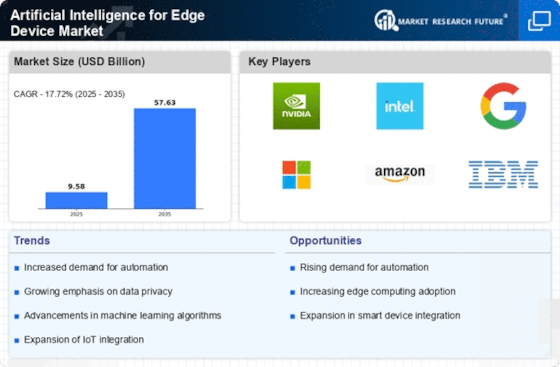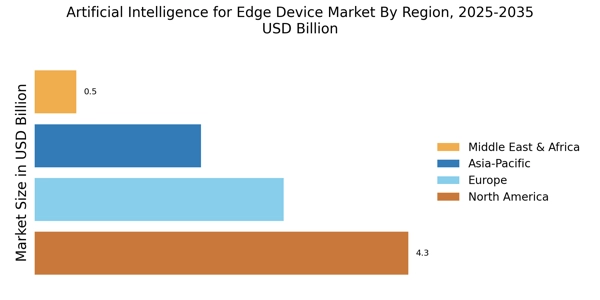Integration of AI with 5G Technology
The integration of Artificial Intelligence with 5G technology is poised to revolutionize the Artificial Intelligence for Edge Device Market. The advent of 5G networks offers unprecedented data transfer speeds and lower latency, enabling edge devices to process and analyze data more efficiently. This synergy is particularly beneficial for applications such as autonomous vehicles, smart cities, and augmented reality, where rapid data exchange is critical. As 5G networks continue to expand, the demand for AI-driven edge solutions is expected to rise significantly. Market analysts suggest that the combination of AI and 5G could lead to a market expansion of approximately 30% over the next few years, as businesses seek to leverage these technologies for enhanced connectivity and performance. This trend underscores the importance of developing AI algorithms that can operate effectively within the constraints and capabilities of 5G networks.
Growing Focus on Edge Computing Solutions
The shift towards edge computing solutions is a key driver in the Artificial Intelligence for Edge Device Market. As organizations seek to minimize latency and bandwidth costs associated with cloud computing, edge devices equipped with AI capabilities are increasingly favored. This transition is particularly relevant in industries such as retail and logistics, where real-time data processing at the edge can optimize supply chain management and enhance customer experiences. Recent data indicates that the edge computing market is expected to reach a valuation of over 15 billion dollars by 2026, with AI playing a crucial role in this growth. The ability to analyze data locally reduces the need for constant cloud communication, thereby improving response times and operational efficiency. Consequently, businesses are investing in AI technologies that support edge computing, further driving the market's expansion.
Rising Demand for Real-Time Data Processing
The Artificial Intelligence for Edge Device Market is experiencing a notable surge in demand for real-time data processing capabilities. As organizations increasingly rely on instantaneous data analysis for decision-making, edge devices equipped with AI are becoming essential. This trend is particularly evident in sectors such as manufacturing and healthcare, where timely insights can lead to improved operational efficiency and patient outcomes. According to recent estimates, the market for AI-enabled edge devices is projected to grow at a compound annual growth rate of over 20% in the coming years. This growth is driven by the need for faster data processing and reduced latency, which traditional cloud computing solutions often cannot provide. Consequently, businesses are investing in AI technologies that facilitate real-time analytics at the edge, thereby enhancing their competitive advantage.
Increased Investment in Smart Infrastructure
Investment in smart infrastructure is a driving force behind the growth of the Artificial Intelligence for Edge Device Market. Governments and private sectors are increasingly allocating resources towards developing smart cities and connected environments, which rely heavily on AI-enabled edge devices. These investments aim to improve urban living conditions, enhance public safety, and optimize resource management. Recent reports indicate that spending on smart infrastructure is expected to exceed 100 billion dollars by 2027, with a significant portion directed towards AI technologies. This trend reflects a broader recognition of the potential benefits of integrating AI into edge devices, such as improved traffic management and energy efficiency. As cities evolve into smarter ecosystems, the demand for AI-driven edge solutions is likely to escalate, further propelling market growth.
Enhanced Security Features in AI Edge Devices
Security concerns are becoming increasingly paramount in the Artificial Intelligence for Edge Device Market. As more devices connect to the internet, the potential for cyber threats escalates. AI-driven edge devices are being developed with advanced security features that can detect and respond to threats in real-time. This proactive approach to security is essential for industries such as finance and healthcare, where data breaches can have severe consequences. The market for AI-enabled security solutions is projected to grow significantly, with estimates suggesting a rise of over 25% in the next few years. By integrating AI into edge devices, organizations can enhance their security posture while maintaining compliance with data protection regulations. This focus on security not only protects sensitive information but also fosters trust among consumers, thereby driving further adoption of AI technologies in edge computing.

















